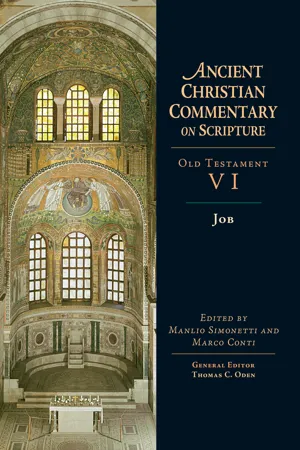
Job
Volume 6
- 253 pages
- English
- ePUB (mobile friendly)
- Available on iOS & Android
About this book
The book of Job presents its readers with a profound drama concerning innocent suffering. Such honest, forthright wrestling with the problem of evil and the silence of God has intrigued a wide gamut of readers both religious and nonreligious.Surprisingly, the earliest church fathers showed little interest in the book of Job. Not until Origen in the early third century is there much evidence of any systematic treatment of the book, and most of Origen's treatment is known to us only from the catenae. More intense interest came at the end of the fourth century and the beginning of the fifth.The excerpts in this Ancient Christian Commentary on Scripture volume focus on systematic treatment. Among Greek texts are those from Origen, Didymus the Blind, Julian the Arian, John Chrysostom, Hesychius of Jerusalem, and Olympiodorus. Among Latin sources we find Julian of Eclanum, Philip the Priest, and Gregory the Great. Among Syriac sources we find Ephrem the Syrian and Isho'dad of Merv, some of whose work is made available here for the first time in English.In store for readers of this volume is a great feast of wisdom from the ancient resources of the church with fresh relevance for today.
Tools to learn more effectively

Saving Books

Keyword Search

Annotating Text

Listen to it instead
Information
JOB
THE HOLINESS, FATHERLY LOVE AND WEALTH OF JOB
JOB 1:1-5
1:1 There Was a Man
1:2 Seven Sons and Three Daughters
1:3 A Great Man
1:4-5 Sanctifying His Children
SATAN OBTAINS LEAVE TO TEMPT JOB
JOB 1:6-19
1:6 Satan Comes Before God
Table of contents
- Cover
- Title Page
- Ancient Christian Commentary Project Research Team
- Contents
- Publisher’s Note Regarding This Digital Edition
- General Introduction
- A Guide to Using This Commentary
- Abbreviations
- Introduction to Job
- Job
- Appendix: Early Christian Writers and the Documents Cited
- Biographical Sketches & Short Descriptions of Select Anonymous Works
- Timeline of Writers of the Patristic Period
- Bibliography of Works in Original Languages
- Bibliography of Works in English Translation
- Authors/Writings Index
- Subject Index
- Scripture Index
- Notes
- Praise for the Ancient Christian Commentary on Scripture
- About the Editors
- Ancient Christian Commentary on Scripture
- More Titles from InterVarsity Press
- Copyright Page
Frequently asked questions
- Essential is ideal for learners and professionals who enjoy exploring a wide range of subjects. Access the Essential Library with 800,000+ trusted titles and best-sellers across business, personal growth, and the humanities. Includes unlimited reading time and Standard Read Aloud voice.
- Complete: Perfect for advanced learners and researchers needing full, unrestricted access. Unlock 1.4M+ books across hundreds of subjects, including academic and specialized titles. The Complete Plan also includes advanced features like Premium Read Aloud and Research Assistant.
Please note we cannot support devices running on iOS 13 and Android 7 or earlier. Learn more about using the app